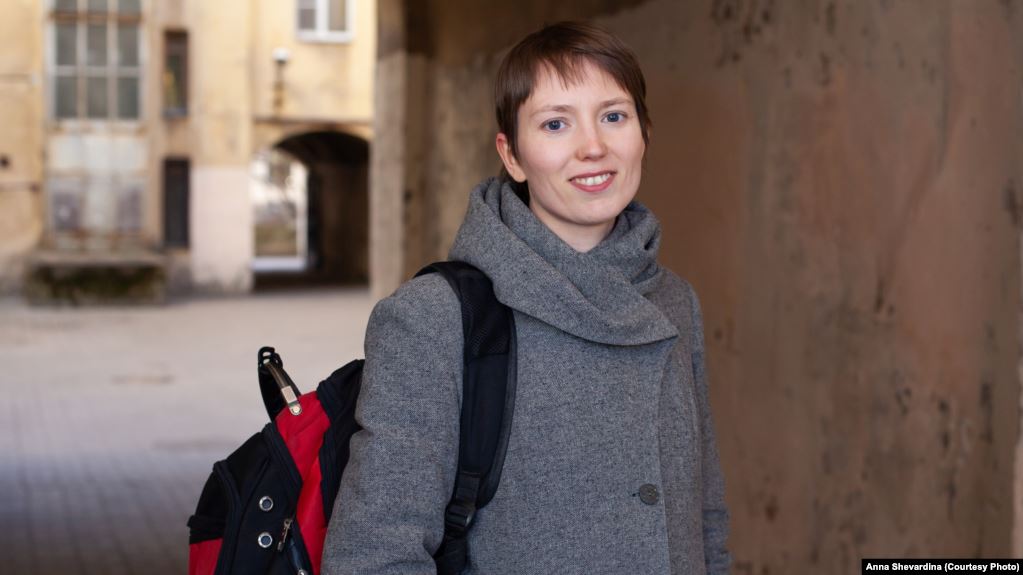And she has used her position as a performance artist to organize events to protect the environment, defend feminist causes, and protest Russian military adventurism.
Apakhonchich believes her activities are behind her being among the first individuals to be branded a “foreign agent” by Russia’s Justice Ministry on December 28.
In an interview with RFE/RL’s Russian Service just after her placement on the Justice Ministry’s registry of “foreign mass media performing the functions of a foreign agent,” Apakhonchich said flatly that she “is not a foreign agent” and that she plans to appeal the decision to add her name to the list of 17 entities and Russian citizens.
“I did nothing to get on this list and I did nothing to be considered a foreign media agent,” she said on December 28. “For me this is the main surprise, because I am not engaged in journalism.”
Apakhonchich suspects that she was named to the list along with four journalists and activists because of her “feminist activity.”
“Apparently, there was no other suitable law for me,” she said, referring to Russia’s “foreign agent” law that was amended in 2017 to allow for alleged “foreign mass media agents.”

On December 30, just two days after Apakhonchich was added to the media-related registry, President Vladimir Putin signed off on additional changes to the law that allows for individuals to be named “foreign agents” if they are considered to be engaged in political activities “in the interests of a foreign state.”
“This law suited them,” Apakhonchich said, recalling her detention in August for participating in a “vulva ballet” outside St. Petersburg’s iconic Mariinsky Theater.
She and a few other participants staged the performance in support of Yulia Tsvetkova, an LGBT activist from Russia’s Far East who has been twice been placed under house arrest and fined for promoting nontraditional sexual relations and distributing pornography for posting body-positive drawings on Facebook that sometimes depicted female genitalia.
But the flash-mob ballet — in which the dancers held up drawings of vulvas and chanted slogans like “pornography is between your ears” and “my vulva is my vulva” — didn’t end well for Apakhonchich. She was dragged into a waiting police van and taken to a police station.
Apakhonchich says she believes the authorities were sending her a clear warning. “They showed me in the summer that they want to shut me up and want me to be scared,” she told RFE/RL.
Apakhonchich says that she continues to worry about Tsvetkova’s “extremely unfair” situation. “Apparently my statements were not enough to protect her, but enough for me to be noticed and appreciated so much that even the status of a ‘foreign agent’ was assigned.”
At this point, five individuals have been designated as foreign agents — all of them as “media.” One, Lev Ponomaryov, is a prominent rights activist. The others are journalists, all of whom contribute to RFE/RL. Lyudmila Savitskaya and Sergei Markelov are freelance correspondents for the North Desk (Sever.Realii) of RFE/RL’s Russian Service. Denis Kamalyagin is editor in chief of the online news site Pskov Province and a contributor to RFE/RL’s Russian Service.
Apakhonchich cannot understand how she came to be on the list. “I have Facebook, Instagram, but I’m not the media,” she said. “But the authorities are ready to interpret my pages on social networks as media.”
She also said that “nobody finances me.”
“I, like any other working person, receive various payments: transfers, material assistance, gifts from friends, both from abroad and…within Russia,” she said. “I use bank accounts a lot. This is the ordinary life of an ordinary person in Russia. But that was enough for the authorities to interpret it that way and declare me to be a foreign-funded media outlet.”
‘People Are Becoming More Powerless’
She is planning to appeal the label, and argues that while the government spends “huge amounts of money and human resources” to detain people engaged in activism, she and various organizations are essentially providing the type of support the state should provide its citizens.
“We have undertaken this state work because at some point you cannot stay away,” she said, adding that activists and NGOs provide services that “various state structures do not provide…. They help people, and for this they are called ‘foreign agents.'”
Inclusion on the registry imposes strict restrictions, such as the obligation to provide regular financial reports on activities and in how publications are labeled.
The restrictions have left her confused about what she can do. “Unfortunately, today I have no real picture,” she said. “I don’t even understand if I can write on Facebook or whether under every post I now have to declare that I am a foreign agent. I am afraid that I will be fined or imprisoned.”

But Apakhonchich also says she cannot stop her work as an activist because “people are becoming more and more powerless” and “I don’t want to put up with it.”
She rattles off a number of causes she has been involved in, including urban protection, environmental issues, and “anti-militaristic” exhibitions and festivals. “It’s important to me,” Apakhonchich says, “therefore I will challenge the decision of the Justice Ministry.”
“This is the only mechanism available to me to oppose something to injustice and cruelty,” she said. “What else is there for us to do? To pretend that everything suits me? I can’t. I disagree. I am not a foreign agent.”


